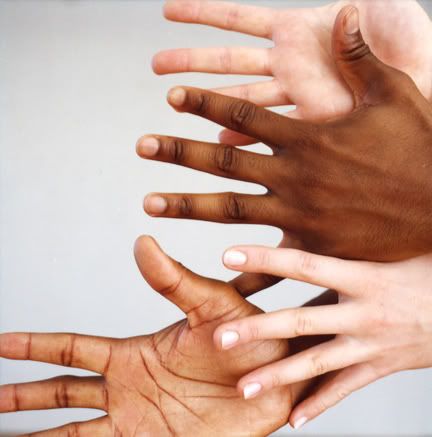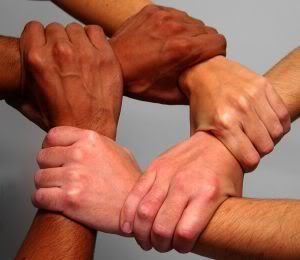
There was a frenzy of activity as the results of the South Dakota primary rolled across the big screen television. WHOOPS & CHEERS were heard throughout.
At approximately 10:00 PM EST on Tuesday, June 3, 2008,
Senator Barack Obama became the presumptive presidential nominee of the Democratic Party. Forty-something years after the Civil Rights Movement limped into obscurity following the death of
Martin Luther King, Jr., a Black man stands at the cusp of acquiring the highest office in the land: President of the United States.
Along with the nomination and hopeful win in November, the nation's Black and brown and underrepresented masses look wishfully to a Washington, DC that will wipe away three centuries of second class status, fifty years of hard fought civil rights, and sixteen months of raucous (and at times, acrimonious) campaigning for the presidency. But what changes can Black America expect?
The United States is structured such that the Chief Executive of the US has NO dominion over the state courts that imprison Black men at alarming rates, the President has no province over state and local school boards who consistently provide substandard education to the those who live in urban and depressed public school systems, the Commander in Chief has no control over the state and local police that will suppress the rights of those without a voice. The war on drugs has been a dismal failure since first uttered by
Ronald Reagan those twenty-something years ago, so drug-infested, economically depressed Black neighborhoods can expect few changes to their condition.

Many Black people have expressed the joy in seeing a Black man ascend to such a lofty mantle in their lifetimes, but also see it as a signal that times are quickly changing. Blacks will no longer be able to use being Black as an excuse for their condition.
Kwabena Sam-Brew of Minnesota was interviewed after the Obama win, "We as black people now have hope that we have never, ever had. I have new goals for my little girl. She can't give me any excuses because she's black."
This joy and hope of Black also carries with it an unintended consequence of an Obama presidency: the end of affirmative action as we know it!
Affirmative action foes are licking their chops in anticipation: how can this country continue to offer preferential treatment to a minority group who has one of its members sitting in the Oval Office?
Ward Connerly, a conservative crusader against affirmative action - policies that favor specific groups - and chairman of the American Civil Rights Institute, tipped his hand when interviewed after Obama received the necessary delegate votes to become the Democratic party's presidential nominee:
"[...watched a replay of Obama's victory] and I choked up. He did it by his own achievement. Nobody gave it to him. The entire argument for race preferences is that society is institutionally racist and institutionally sexist, and you need affirmative action to level the playing field. The historic success of Senator Obama, as well as Senator Clinton, dismantles that argument."
Connerly expressed hope that Obama's rise would help his own efforts to end affirmative action on the basis of race.
One step further,
John McWhorter, of the
New York Sun believes that Obama's win shows that racism in this country is in retreat. Although, racism does exist, he opines that its practitioners are few and the effects on Blacks is minuscule. Excerpts of his
New York Sun article "Racism in Retreat" follows:
Well, here we are. Are there some bigots? Of course. Did they, or any purported instance of "racism" during the campaign, keep Barack Obama from the nomination?
His victory demonstrates the main platform of my race writing. The guiding question in everything I have ever written on race is: Why do so many people exaggerate about racism?
This exaggeration is a nasty hangover from the sixties, and the place it has taken as a purported badge of intellectual and moral gravitas is a tire-block on coherent, constructive sociopolitical discussion.
Note that I did not say that there was no racism. There seems to be an assumption that when discussing racism, it is a sign of higher wisdom to neglect the issue of its degree. This assumption is neither logical nor productive. I reject it, and am pleased to see increasing numbers of black people doing same.
Of course there is racism. The question is whether there is enough to matter. All evidence shows that there is not. No, the number of black men in prison is not counterevidence: black legislators were solidly behind the laws penalizing possession of crack more heavily than powder.
In any case, to insist that we are hamstrung until every vestige of racism, bias, or inequity is gone indicates a grievous lack of confidence, which I hope any person of any history would reject.
Yet every time some stupid thing happens — some comedian says a word, some sniggering blockhead hangs a little noose, some study shows that white people tend to get slightly better car loans — we are taught that racism is still mother's milk in the U.S. of A. "Always just beneath the surface."
Barack Obama's success is the most powerful argument against this way of thinking in the entire four decades since recreational underdoggism was mistaken as deep thought. A black man clinching the Democratic presidential nomination — and rather easily at that — indicates that racism is a lot further "beneath the surface" than it used to be.
And if Mr. Obama ends up in the White House, then it might be time to admit that racism is less beneath the surface than all but fossilized.
Lastly, one need look no farther than Barack Obama to see hints of how he sees a significant shift in affirmative action in the US. When asked about how his daughters should be viewed when they are seeking admission to college, he said that his daughters, "...should probably be treated by any admissions officer as folks who are pretty advantaged. I think that we should take into account white kids who have been disadvantaged and have grown up in poverty and shown themselves to have what it takes to succeed."
Obama goes on to clarify his position on the matter, saying that affirmative action should combine both race-based and class-based preferences. He said, "I don't think those concepts are mutually exclusive. I think what one can say is that in our society race and class still intersect, and there are a lot of African American kids who are struggling, that even those who are in the middle class may be first generation as opposed to fifth or sixth generation college attendees, and that we all have an interest in bringing as many people together to help build this country."
Read the
International Herald Tribune about the Obama victory
here.
Read the entire
New York Sun article by John McWhorter on race in America
here.
Click the link for
On The Issues to see where Barack Obama stands on affirmative action.
plez sez: this was a tough entry to write, i spent over a week going over notes and composing my thoughts.
plezWorld grew up in the 60's and 70's, i was a beneficiary, to a small degree, of affirmative action: i participated in a number of programs geared toward encouraging minority students to study engineering and my cooperative education assignment with NASA was a program for minority engineering students. i got into college on my merits, since i had stellar grades in high school and my SAT scores were superb (i was accepted to study electrical engineering via early admissions)!
i'm the same age as Barack Obama and have an outlook on life that is similar to his, even though i was raised by my Black parents, my formative years were spent in a predominantly white enclave in the suburbs of new york city (also known as westchester county). i went to predominantly white schools, a predominantly white university (GO TECH!), and i have been in the minority at every job i've held since high school.
i've always had mixed feelings about affirmative action and have never been a proponent of quotas or set asides based on race. i understand that there is a likelihood of the taint of one's accomplishments when there is a perception that your race (or sex) was the main reason for your success. even though the perception may be grounded in falsehoods, your hard work and determination may be compromised if others have the perception that you did not make it on your merits.
i believe that admissions to state universities and contracts for government work should be awarded to ensure minority representation that is reflective of the community (or state), but i also feel that students and contractors should meet the minimum requirements that are set for everyone else. just as the children of alumni and big donors to universities get some preferences (see George W. Bush), there should be mechanisms in place to ensure that qualified minority students are able to secure slots at these universities. just as lobbyists and government insiders can "grease the skids" for government contracts for their friends and network, the government has an obligation to ensure that qualified minority contractors (and workers) are given ample opportunity to bid and win government contracts.
i have no doubt that affirmative action foes, like ward connerly, won't wait for long after Obama's election to begin the work of dismantling affirmative action as we know it. connerly and his ilk will trumpet the call for a color-blind system that will undoubtedly leave poor and unprepared Black communities in their wake. any chance for affirmative action's survival will hinge on its proponents' ability to quickly institute hybrid race- & class-based system to replace the soon-to-be antiquated race-based system, as advocated by Obama.
i'm afraid that time is running out and those communities who have not heeded the call to provide quality education will be left further behind, since affirmative action was only a boost to those who had the where with all to take advantage of its opportunities. things will undoubtedly get worse before they get better: look at the
low minority rates at california universities after connerly did away with affirmative action there (none have more than 4% Black enrollment with UC-San Diego with a Black enrollment of 1.2%).
on january 20, 2009, while we're cheering the inauguration of President Barack Obama, a stalwart institution - maybe
the only successful institution - of the civil rights movement will begin to be dismantled.
 Four dollar gasoline is finally driving Atlantans from their love affair with gridlock and rush hour traffic. The Atlanta Journal-Constitution reports that traffic is down and MARTA (Metropolitan Atlanta Rapid Transit Authority) ridership is up... way up! The traffic in Atlanta is considered by many to be the worse on the planet, but there are indications that the sudden rise in gas prices are finally forcing commuters in the metro Atlanta area to consider alternate routes: MARTA, van pools, commuter buses, telecommuting, etc.
Four dollar gasoline is finally driving Atlantans from their love affair with gridlock and rush hour traffic. The Atlanta Journal-Constitution reports that traffic is down and MARTA (Metropolitan Atlanta Rapid Transit Authority) ridership is up... way up! The traffic in Atlanta is considered by many to be the worse on the planet, but there are indications that the sudden rise in gas prices are finally forcing commuters in the metro Atlanta area to consider alternate routes: MARTA, van pools, commuter buses, telecommuting, etc.




































